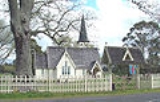
Pakaraka
Encyclopedia

New Zealand
New Zealand is an island country in the south-western Pacific Ocean comprising two main landmasses and numerous smaller islands. The country is situated some east of Australia across the Tasman Sea, and roughly south of the Pacific island nations of New Caledonia, Fiji, and Tonga...
and is one of the oldest settlements in the Bay of Islands
Bay of Islands
The Bay of Islands is an area in the Northland Region of the North Island of New Zealand. Located 60 km north-west of Whangarei, it is close to the northern tip of the country....
. It is located at the junction of State Highway 1
State Highway 1 (New Zealand)
State Highway 1 is the longest and most significant road in the New Zealand roading network, running the length of both main islands. It appears on road maps as SH 1 and on road signs as a white number 1 on a red shield, but it has the official designations SH 1N in the North Island, SH 1S in the...
and 10.
A pā
Pa (Maori)
The word pā can refer to any Māori village or settlement, but in traditional use it referred to hillforts fortified with palisades and defensive terraces and also to fortified villages. They first came into being about 1450. They are located mainly in the North Island north of lake Taupo...
, was located at the base of, and on the slopes of, Pouerua
Pouerua
Pouerua is a 270 m high basaltic scoria cone, in the Kaikohe-Bay of Islands volcanic field in New Zealand. It was the site of a pā that was studied during a major archeological project in the 1980s.-References:**-External links:*...
a 270 m high basaltic scoria cone. The pā was studied during a major archeological project in the 1980s.
Parts of the Flagstaff War
Flagstaff War
The Flagstaff War – also known as Hone Heke's Rebellion, the Northern War and erroneously as the First Māori War – was fought between 11 March 1845 and 11 January 1846 in and around the Bay of Islands, New Zealand...
were fought around Pakaraka in 1845-6.
Notable people
- Hone HekeHone HekeHone Wiremu Heke Pokai was a Māori rangatira and war leader in Northern New Zealand and a nephew of Hongi Hika, an earlier war leader of the Ngāpuhi iwi. Hone Heke is considered the principal instigator of the Flagstaff War....
, Ngā Puhi chief, was born in Pakaraka in about 1808. - The missionary Henry WilliamsHenry Williams (missionary)Henry Williams was one of the first missionaries who went to New Zealand in the first half of the 19th century....
retired to Pakaraka and built a church in 1851. The church is named Holy Trinity Church as Trinity Sunday was the day on which Henry was ordained by the Bishop of London, and Trinity Sunday was the last day that HenryHenry Williams (missionary)Henry Williams was one of the first missionaries who went to New Zealand in the first half of the 19th century....
and Marianne WilliamsMarianne WilliamsMarianne Williams together with her sister-in-law Jane Williams were pioneering educators in New Zealand. They set up the first schools for Māori children and adults as well as educating the children of the Church Missionary Society in the Bay of Islands, New Zealand...
spent at PaihiaPaihiaPaihia is the main tourist town in the Bay of Islands in the far north of the North Island of New Zealand. It is located close to the historic towns of Russell, and Kerikeri, 60 kilometres north of Whangarei. The origin of the name Paihia is obscure. One, possibily apocryphal, attribution is to...
before moving to Pakaraka. They lived by the church in a house known as The Retreat, that still stands.
Education
Pakaraka School is a coeducational full primary (years 1-8) school with a decile ratingSocio-Economic Decile
Decile, Socio-Economic Decile or Socio-Economic Decile Band is a widely used measure in education in New Zealand used to target funding and support to more needy schools....
of 2 and a roll of 57. 92% of the students are Māori.

